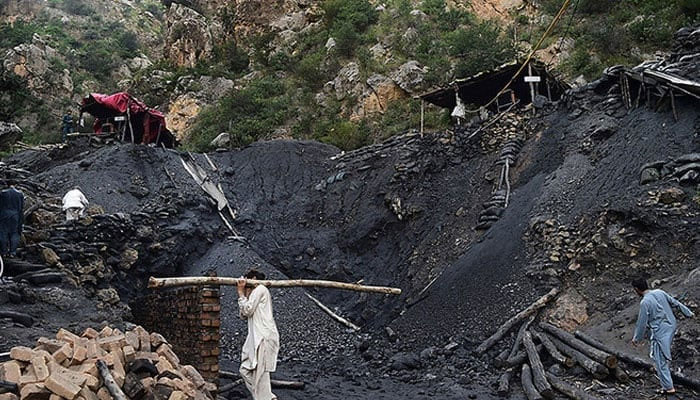Untapped mineral wealth holds strategic promise for Pakistan
LAHORE: Pakistan’s vast mineral wealth could significantly transform its economy if managed strategically. Experts point to the need for long-term planning, public-private partnerships, legal clarity, and transparent governance to unlock the potential of this largely dormant sector.
Despite having abundant mineral resources, Pakistan has failed to fully exploit them due to underinvestment, inadequate infrastructure, outdated geological surveys, and persistent governance and security challenges -- particularly in Balochistan and tribal areas. Investor confidence has been further dampened by inconsistent policies and legal disputes.
Infrastructure deficiencies also constrain development. There is minimal local value addition, with most minerals exported in raw form, thereby missing downstream economic benefits.Among Pakistan’s key underdeveloped assets is the Reko Diq copper and gold deposit in Chagai district, Balochistan -- one of the world’s largest untapped reserves. The site holds an estimated 5.9 billion tonnes of ore containing 0.41 per cent copper and 0.22 grams of gold per tonne. Canadian mining giant Barrick Gold is leading the development, though progress has been slow due to disputes.
Iron ore deposits have been identified in Kalabagh, Chiniot and Nok Kundi, with significant reserves in Chiniot. However, these remain largely unexplored for commercial extraction. Lead and zinc mining is underway at a small scale at the Duddar Mine in Balochistan, with potential for greater exploitation.
Industrial minerals such as gypsum, limestone and rock salt are being mined in Punjab and Khyber Pakhtunkhwa for use in cement, construction and food processing. Khewra’s salt is internationally known, yet value-added exports remain limited.
High-grade chromite from Muslim Bagh and Khanozai in Balochistan is exported raw with little domestic processing. Similarly, minerals like bentonite, bauxite, and Fuller’s Earth, found in Sindh, KP and Balochistan, are underutilised despite applications in ceramics, cosmetics and drilling.
Thar coal, with estimated reserves exceeding 175 billion tonnes of lignite, is being developed under CPEC, though environmental and cost concerns persist. Small-scale uranium extraction in Dera Ghazi Khan supports civil nuclear programmes, but commercial viability has not been fully pursued.
Gemstones including emeralds, rubies, topaz, and tourmaline are found in Swat, Gilgit-Baltistan, and KP, yet a lack of certification labs, outdated mining methods, and weak international branding limit Pakistan’s competitiveness in the global market.
Historically, China has led investment in Pakistan’s mineral sector. However, recent developments indicate a growing interest from the US, particularly in critical minerals such as copper, gold and lithium.
In April 2025, Senior Bureau Official at the US State Department Eric Meyer led a high-level delegation to the Pakistan Minerals Investment Forum in Islamabad. He met with Prime Minister Shehbaz Sharif, Army Chief General Asim Munir, and Foreign Minister Ishaq Dar, calling mineral development “a core area of mutual interest” and encouraging US firms to explore investment opportunities.
US Secretary of State Marco Rubio also held discussions with Ishaq Dar in April, highlighting collaboration on critical minerals as a pathway to deepen bilateral trade and investment. The American approach blends diplomacy, business engagement, financial tools, and trade policy -- signalling a strategic, multi-pronged interest in Pakistan’s untapped mineral wealth.
-
 Chinese New Year Explained: All You Need To Know About The Year Of The Horse
Chinese New Year Explained: All You Need To Know About The Year Of The Horse -
 Canadian Passport Holders Can Now Travel To China Visa-free: Here's How
Canadian Passport Holders Can Now Travel To China Visa-free: Here's How -
 Glen Powell Reveals Wild Prank That Left Sister Hunting Jail Cells
Glen Powell Reveals Wild Prank That Left Sister Hunting Jail Cells -
 Edmonton Weather Warning: Up To 30 Cm Of Snow Possible In Parts Of Alberta
Edmonton Weather Warning: Up To 30 Cm Of Snow Possible In Parts Of Alberta -
 'A Knight Of The Seven Kingdoms' Episode 5: What Time It Airs And Where To Stream
'A Knight Of The Seven Kingdoms' Episode 5: What Time It Airs And Where To Stream -
 Amy Schumer Drops Cryptic Message On First Valentine Amid Divorce
Amy Schumer Drops Cryptic Message On First Valentine Amid Divorce -
 Savannah Guthrie Sends Desperate Plea To Mom Nancy Kidnapper
Savannah Guthrie Sends Desperate Plea To Mom Nancy Kidnapper -
 NBA All-Star 2026 Shake-up: Inside The New USA Vs World Tournament Format
NBA All-Star 2026 Shake-up: Inside The New USA Vs World Tournament Format -
 Warner Bros Consider Reopening Deal Talks With Paramount, Says Reports
Warner Bros Consider Reopening Deal Talks With Paramount, Says Reports -
 Andrew Mountbatten Windsor Faces Future With UK MPs, Says Expert
Andrew Mountbatten Windsor Faces Future With UK MPs, Says Expert -
 Eva Mendes Shared Bedroom Photos For Ryan Gosling On Valentine’s
Eva Mendes Shared Bedroom Photos For Ryan Gosling On Valentine’s -
 Shamed Andrew Told 'nobody Is Above The Law' Amid Harrowing Silence
Shamed Andrew Told 'nobody Is Above The Law' Amid Harrowing Silence -
 Gisele Bundchen Melts Hearts With Sweet Bike Ride Glimpse Featuring Son
Gisele Bundchen Melts Hearts With Sweet Bike Ride Glimpse Featuring Son -
 Prince William Found Meghan Markle ‘quite Refreshing’ At Start
Prince William Found Meghan Markle ‘quite Refreshing’ At Start -
 Kate Middleton Knew Should Could Not Be ‘voice Of Reason’ With Prince Harry
Kate Middleton Knew Should Could Not Be ‘voice Of Reason’ With Prince Harry -
 Rihanna Has Wardrobe Malfunction At A$AP Rocky Fashion Show
Rihanna Has Wardrobe Malfunction At A$AP Rocky Fashion Show




